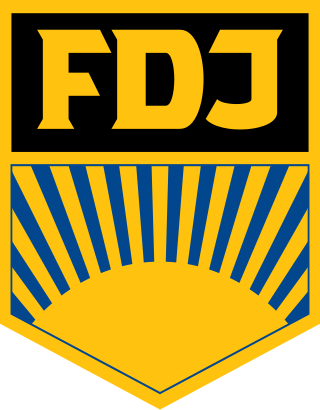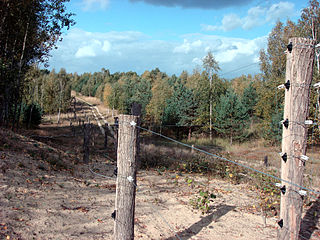This is a list of the most notable films produced in German cinema.
Contents
For an alphabetical list of articles on German films see Category:German films.
This is a list of the most notable films produced in German cinema.
For an alphabetical list of articles on German films see Category:German films.
In 1949, both the Federal Republic of Germany (West Germany) and the German Democratic Republic (East Germany) came into existence, in 1990 they reunited as the Federal Republic, again informally referred to as simply Germany.
Because of the impact of the Second World War, and restrictions imposed on the country by the Allied Powers, film production between 1945 and 1948 was limited and did not pick up really until after 1950. See also Category:West German films

East Germany, officially known as the German Democratic Republic, was a country in Central Europe from its formation on 7 October 1949 until its reunification with West Germany on 3 October 1990. Until 1989, it was generally viewed as a communist state and described itself as a socialist "workers' and peasants' state". The economy of the country was centrally planned and state-owned. Although the GDR had to pay substantial war reparations to the Soviets, its economy became the most successful in the Eastern Bloc.

West Germany is the common English name for the Federal Republic of Germany from its formation on 23 May 1949 until its reunification with East Germany on 3 October 1990. It is sometimes known as the Bonn Republic after its capital city of Bonn. During the Cold War, the western portion of Germany and the associated territory of West Berlin were parts of the Western Bloc. West Germany was formed as a political entity during the Allied occupation of Germany after World War II, established from 12 states formed in the three Allied zones of occupation held by the United States, the United Kingdom, and France.

The Social Democratic Party of Germany is a social democratic political party in Germany. It is one of the major parties of contemporary Germany.

Neue Ostpolitik, or Ostpolitik for short, was the normalization of relations between the Federal Republic of Germany and Eastern Europe, particularly the German Democratic Republic beginning in 1969. Influenced by Egon Bahr, who proposed "change through rapprochement" in a 1963 speech at the Evangelische Akademie Tutzing, the policies were implemented beginning with Willy Brandt, fourth Chancellor of the FRG from 1969 to 1974, and winner of the 1971 Nobel Prize for Peace for his efforts to place this policy at the acme of the FRG.

The Basic Law for the Federal Republic of Germany is the constitution of the Federal Republic of Germany.

The history of Germany from 1945 to 1990 comprises the period following World War II. The period began with the Berlin Declaration, marking the abolition of the German Reich and Allied-occupied period in Germany on 5 June 1945, and ended with the German reunification on 3 October 1990.

The Free German Youth is a youth movement in Germany. Formerly, it was the official youth wing of the German Democratic Republic (GDR) and the Socialist Unity Party of Germany.

Athletes from Germany (GER) have appeared in 27 of the 30 Summer Olympic Games, having competed in all Games except those of 1920, 1924 and 1948, when they were not permitted to do so. Germany has hosted the Summer Olympic Games twice; the 1936 Games in Berlin, and the 1972 Games in Munich.

Republikflucht was the colloquial term in the German Democratic Republic for illegal emigration to West Germany, West Berlin, and non-Warsaw Pact countries; the official term was Ungesetzlicher Grenzübertritt. Republikflucht applied to both the 3.5 million Germans who migrated legally from the Soviet occupation zone and East Germany before the Berlin Wall was built on 13 August 1961, and the thousands who migrated illegally across the Iron Curtain until 23 December 1989. It has been estimated that 30,000 people left the GDR per year between 1984 and 1988, and up to 300,000 per year before the construction of the Berlin Wall in 1961.
An exclusive mandate is a government's assertion of its legitimate authority over a certain territory, part of which another government controls with stable, de facto sovereignty. It is also known as a claim to sole representation or an exclusive authority claim. The concept was particularly important during the Cold War period when a number of states were divided on ideological grounds.

Dallgow-Döberitz is a municipality in the Havelland district, in Brandenburg, in eastern Germany.
The legal status of Germany concerns the question of the extinction, or otherwise continuation, of the German nation-state following the rise and downfall of Nazi Germany, and constitutional hiatus of the military occupation of Germany by the four Allied powers from 1945 to 1949. It became current once again when the German Democratic Republic joined the Federal Republic of Germany in 1990.

Athletes from Germany have taken part in most of the modern Olympic Games held since 1896. Germany has hosted three Olympic Games, in 1936 both the Winter and Summer Games, and the 1972 Summer Olympics. In addition, Germany had been selected to host the 1916 Summer Olympics as well as the 1940 Winter Olympics, both of which had to be cancelled due to World Wars. After these wars, Germany was banned from participating in the 1920, 1924 and 1948 Olympics.

Schwanheide is a municipality in the Ludwigslust-Parchim district, in Mecklenburg-Vorpommern, Germany.

Like the flags of the Weimar Republic, West Germany, and present-day Germany, the flag of East Germany, the German Democratic Republic, showed the colours black, red and gold. The coat of arms, which, from 1959, was a hammer, compass and wreath of wheat, was located in the middle of the colour red.

Inner German relations, also known as the FRG-GDR relations, East Germany-West Germanyrelations or German-German relations, were the political, diplomatic, economic, cultural and personal contacts between the Federal Republic of Germany and the German Democratic Republic, at the period of the West-East division in German history from the founding of East Germany on 7 October 1949 to Germany's reunification on 3 October 1990.